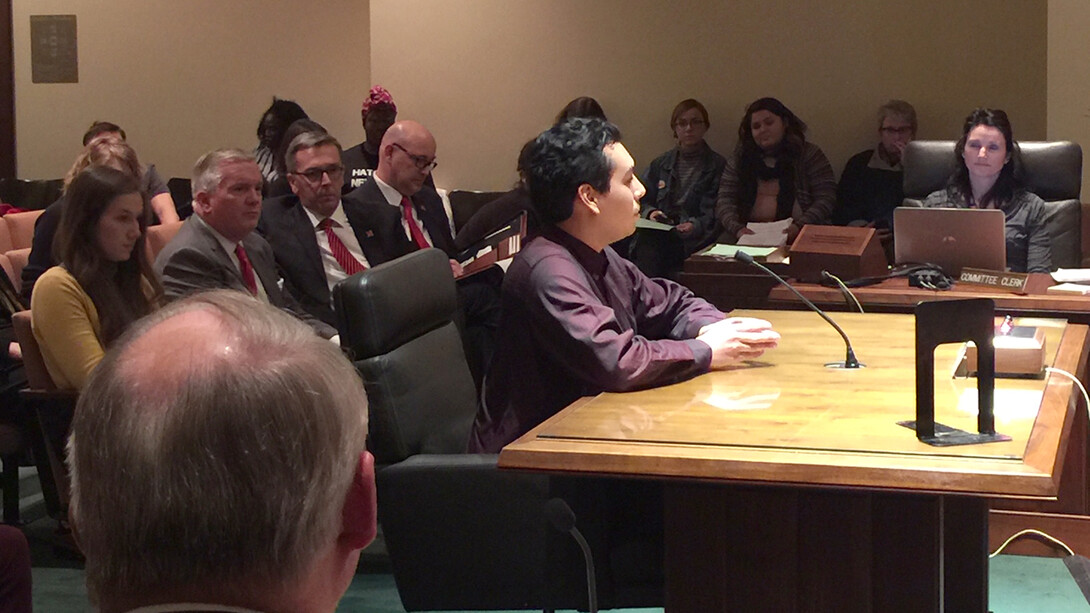
University of Nebraska President Hank Bounds and Board of Regents Chairman Rob Schafer were joined Feb. 14 by students, leaders in business and agriculture, community members and other NU supporters in asking members of the Legislature’s Appropriations Committee to make affordable, excellent higher education a priority for Nebraska’s future.
Representatives of Nebraska’s chambers of commerce, Agriculture Builders of Nebraska and the private sector; students; and a cancer patient who has received life-saving treatment at the medical center were among those testifying to the Committee. In addition, hundreds of Nebraskans wrote letters to the Committee voicing their support for continued investment in the University and expressing deep concerns about the impact the Governor’s recommended budget reductions would have on the University’s competitiveness and affordability for students and families.
In a packed hearing room, Bounds asked legislators to consider what kind of future they envision for their children and grandchildren.
“We are at a defining moment in Nebraska’s history. We have a choice to make,” Bounds said during his testimony.
“Are we going to reaffirm the partnership between the state and its public university that has opened the door of opportunity to young people and driven economic growth for almost 150 years?
“Or will you decide that you no longer see the value that the University of Nebraska provides, and make it harder for us to offer affordable and excellent education to our 53,000 students?”
Many students and several faculty from University of Nebraska institutions turned out to testify or otherwise show their opposition to the cuts. Several wore “Hate Will Never Win” t-shirts from a University of Nebraska-Lincoln unity rally also held Feb. 14.
Seth Marshall, the first on his father’s side of his family to attend a four-year college, said he thought he would have to give up his dream of a university degree when his family’s home went into foreclosure when he was in high school. He went to community college for four years and now is a junior studying journalism at the University of Nebraska-Lincoln. He has paid his way through college, he said, and is afraid budget cuts and tuition increases will put college out of his financial reach.
“If you reject these budget cuts, you’re telling a 17-year-old boy whose family’s house was foreclosed upon you can get a university education,” he said.
Jewel Rodgers, a management student, passionately urged the committee to remember they’re dealing with people’s lives, not just numbers.
“A college degree has the power to bring a whole family lineage out of poverty,” she said. Even though lawmakers have a hard job, Rodgers urged them to consider how to make higher education accessible to everyone.
University of Nebraska-Lincoln Chancellor Ronnie Green did not testify at the hearing, nor did other chancellors of University of Nebraska institutions.
Green said University of Nebraska-Lincoln students did an impressive job stating their case.
“The testimony of our students was touching,” he said. “They really brought home the reality of what’s at stake under the proposed budget cuts.”
Under the governor’s budget proposal, state funding to the university system would be cut $11 million this year, and next year’s appropriation would be reduced by $23 million. These represent one-third of the governor’s proposed cuts, despite the fact that the university makes up only 13 percent of state spending. And the proposed cuts represent the third cut to the university in the past year.
The governor’s recommendation has required university-wide teams to begin campus processes for budget reductions. The University of Nebraska-Lincoln, University of Nebraska at Omaha, University of Nebraska at Kearney and University of Nebraska Medical Center all released proposed cuts this week which will now be subject to campus vetting processes. The proposals include elimination of academic programs, job reductions and a retreat from the University’s statewide presence.
Bounds said the release of the proposed cuts has made for a difficult week for the university, particularly at a time of momentum and opportunity when the university is in a strong position to help grow Nebraska’s workforce and economy. The university produces 11,000 new graduates each year for the workforce, returns $6 for every $1 the state invests and is increasingly a leader in areas important to the state and world like agriculture, cancer research and national defense.
Nevertheless, painful conversations about programmatic cuts and tuition increases are necessary, Bounds said, given that the university has already identified $30 million in operational reductions as a result of past cuts in state funding. The university has about the same number of employees supported by tax and tuition dollars today as it did in 2000, even though enrollment has grown from 45,000 to almost 53,000.
Bounds asked the committee to restore the university’s base funding to $580 million in 2018-19 in order to limit damage to NU’s trajectory and send the right message to young people, top talent and companies the state hopes to recruit.
“I’m asking you to make a choice about the future of Nebraska,” Bounds said. “I hope you will decide that the University of Nebraska is a priority for our state.”







